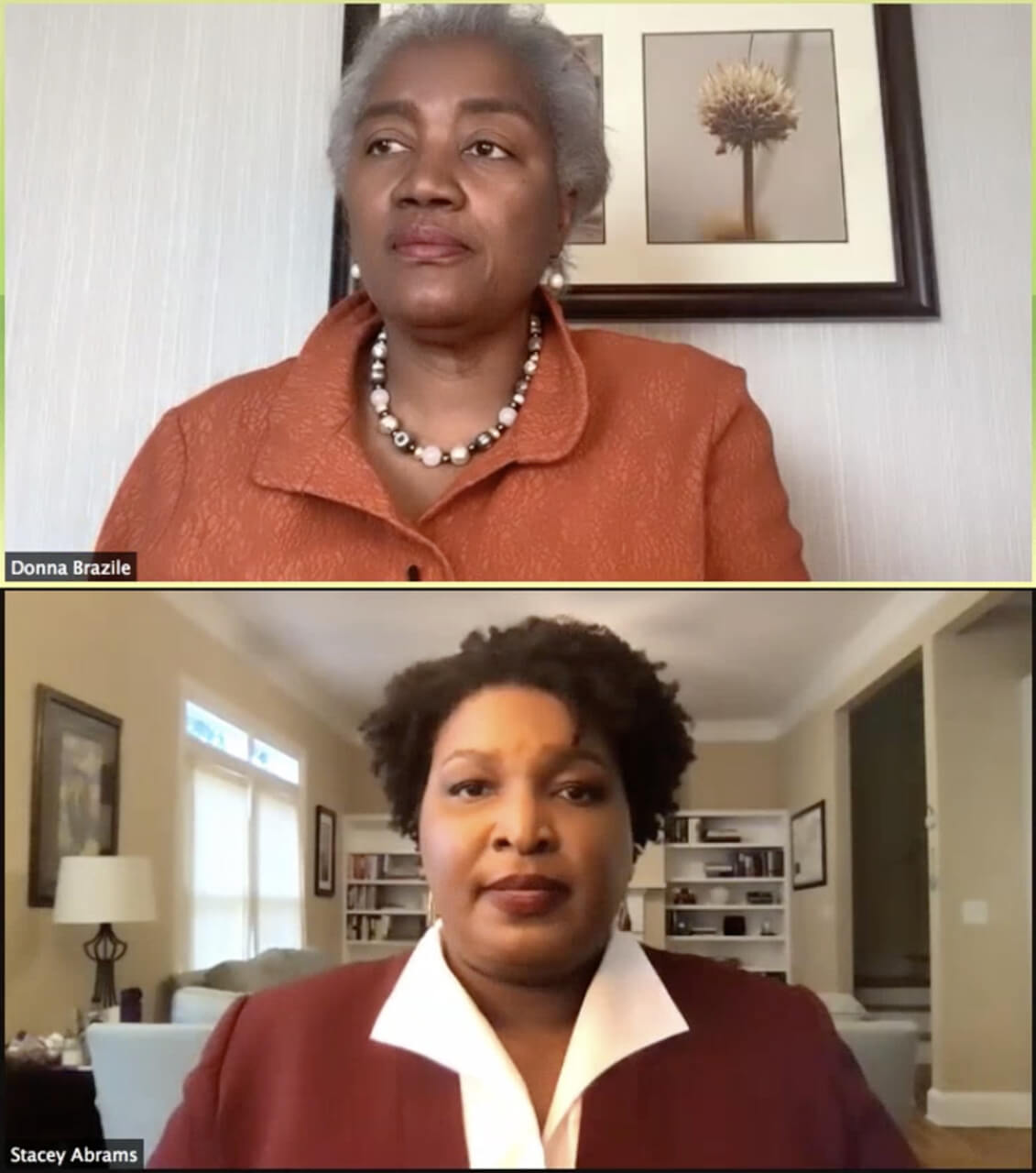 WASHINGTON – With fewer than 30 days until votes are counted in the 2020 general election, political leaders Stacey Abrams and Spencer Overton joined political strategist Donna Brazile for a conversation about combatting voter suppression. The virtual conversation took place as part of the 2020-21 Gwendolyn S. and Colbert I. King Endowed Chair in Public Policy Lecture Series, chaired by Brazile.
WASHINGTON – With fewer than 30 days until votes are counted in the 2020 general election, political leaders Stacey Abrams and Spencer Overton joined political strategist Donna Brazile for a conversation about combatting voter suppression. The virtual conversation took place as part of the 2020-21 Gwendolyn S. and Colbert I. King Endowed Chair in Public Policy Lecture Series, chaired by Brazile.
Overton, president of the Joint Center for Political and Economic Studies, opened with a conversation on the way disinformation online leads to voter suppression at the polls. Overton discussed what he called “new voter suppression,” referencing examples where ads targeting the Black community led to voter suppression in the 2016 elections.
“A Facebook page was started in January 2016. It claimed to be a page on Black culture and politics,” said Overton. “Closer to the elections, the Facebook page paid for and posted ads claiming things like, ‘We don’t have any other choice this time but to boycott the election. Don’t go vote.’ Investigations later revealed that the Facebook page was actually a fake page set up by a Russian internet agency.”
The ads from this Facebook page targeted Black users to discourage them from participating in the elections. Overton also discussed barriers to confronting disinformation online that leads to voter suppression, noting President Trump’s use of presidential power to discourage social media platforms from stopping disinformation. In addition, Overton debunked the myth of voter fraud and encouraged voters to get ahead of some of the real barriers to successfully casting their vote.
“There’s been a lot of talk about voter fraud,” said Overton. “A person is 13 times more likely to be struck by lightning in their life than to commit voter fraud. It’s a nonissue. We do have some challenges, though. In 2016, about 20 percent of mail-in ballots were rejected because of no signature. Twenty-three percent were rejected because they were not received on time. In thinking about all of the issues with COVID-19 and delays in the mail, these are the issues that we’ve got to deal with.”
Both Overton and Abrams stressed the need for early voting in order to get ahead of these kinds of challenges.
“We’ve had voter suppression since the beginning of this country,” said Abrams. “Don’t panic and don’t delay, and I think we can get it done. The drop boxes are safe and secure. You want to vote as early as possible.”
Abrams also stressed the particular importance of voting during the 2020 elections, which is also a census year.
“Because this is a census year, we are not only re-doing the outcome of 2016, we’re also re-doing 2010,” said Abrams. “In the 2008 election, everyone was excited. But because there was not active participation in 2010, all of those advances were halted. State legislators were taken over because of the census and redistricting. We are watching the same thing happen again.”
Abrams said that because the upcoming election falls on a census year, it determines not only who becomes the president but also who gets to have a voice over the next 10 years. Her conversation with an audience of Howard University students was fitting as she joined the conversation on the heels of launching her new campaign, Civics for the Culture, a national effort by Abrams’ voting rights organization Fair Fight Action. Abrams teamed up with pop star Selena Gomez to launch the campaign, which targets young people of color to vote in the November election.
“We know young people will make the difference,” said Abrams. “Gen Y to Gen Z are the largest voting block in this election. We want to make sure their voice is heard.”
Brazile urged voters listening to visit iwillvote.com or vote.org to get the most accurate information on their voting status and information about absentee voting.
# # #
About Howard University
Founded in 1867, Howard University is a private, research university that is comprised of 13 schools and colleges. Students pursue studies in more than 120 areas leading to undergraduate, graduate and professional degrees. The University operates with a commitment to Excellence in Truth and Service and has produced one Schwarzman Scholar, three Marshall Scholars, four Rhodes Scholars, 11 Truman Scholars, 25 Pickering Fellows and more than 165 Fulbright recipients. Howard also produces more on-campus African-American Ph.D. recipients than any other university in the United States. For more information on Howard University, visit www.howard.edu.
Media Contact: Misha Cornelius, misha.cornelius@howard.edu




